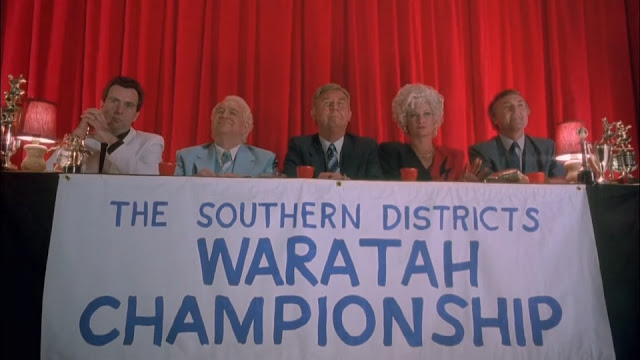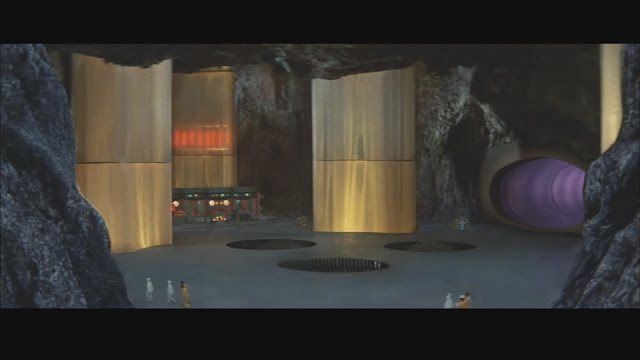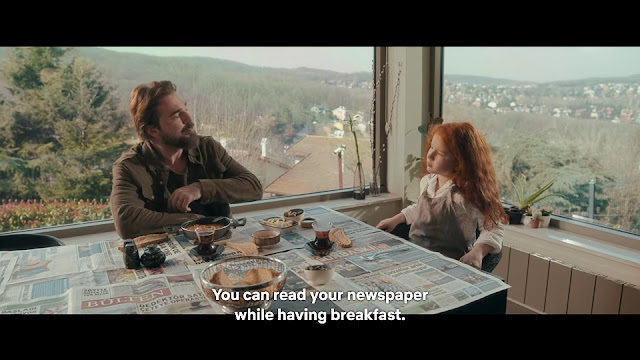Australian director Baz Lurhmann has built up a reputation as being divisive. His glitzy and showy style appeals to many, but grates on others. It's generally agreed upon though, among both his fans and detractors, that his debut film Strictly Ballroom is a classic no matter how you cut it. So let's dig into Lurhmann's output from 'before he lost his mind'...
Scott
Hastings is a young ballroom dancer in training, and all set to win a
local dance competition when he suddenly dances his own steps, breaking
the strictly regimented rules. Now without a partner, and pressured by
everyone to 'dance properly', he is approached by put-upon beginner Fran. Together they train in secret, hoping to dazzle. But can they win the competition when everything is against them? Or will they provide a shining example for anyone else wanting to be different...
Strictly Ballroom is a film that came up through adversity. Beginning life on the stage, industry newcomer Baz was determined to bring it to the silver screen. Unfortunately he lived in Australia, which may have a great film industry in terms of quality, but lacks American money. It was an uphill battle to get the film made, with a studio that wanted to pull the plug many times, and setbacks, big and small. But despite all this, and despite a lack of faith from the higher-ups, the film was eventually released to mass accolades, in and out of the country. It became on of the highest grossing Australian films of all time, and is regarded as one of our all-time greats.
Strictly Ballroom gets off to a quasi-documentary start, introducing us to the setting and characters quickly. We see all the showiness and rigid hierarchy of the dancing community (not to mention the insane outfits!), and how little any kind of freedom is tolerated. It's surprising to discover! I just figured dancers in these communities could do whatever steps they wanted. I had no idea they were so restricted.
The
story here is fairly basic, of a young man trying to prove himself, with a Cinderella type story thrown
in for good measure. These elements all go great together, and are told in an original way, with plenty of humour, romance, and drama, and a few twists and turns.
The film's antagonists range from actual villains, to people close to Scott who just have blinders on, being told what to do for so long they believe it themselves, and force it on others. Naturally
when pressed on what's actually wrong with the steps, all they can do is fall back on the 'Well, you'd have to be an expert to know'
argument.
With some movies, they could be made in any country, especially when it comes to a subject like ballroom dancing. To this film's credit though, it is unmistakeably Australian. I love
how Aussie the dancers are, from their local vernacular, the coarse language, to their very down-to-earth jobs (like a greasy mechanic discussing the Viennese Waltz).
Scott is a likeable hero. He's been raised in this very constrained way, and has become an expert within those boundaries, but yearns for more, like part of him is missing. The massive pushback he gets from merely questioning things only frustrates him more. It's quiet and 'mousy' Fran who's the one to get him out of his funk and help him for the better. While he's skeptical at first of an amateur wanting to help a professional, we soon discover her hidden talents. Scott's flaw is in conquering his doubts about what everyone will think, and must learn not to live in fear.
Fran starts out shy, but with a fiery Latin streak when things get rough, which helps begin a fruitful working relationship with Scott, which soon grows through a believable romance. It starts out as a one-sided crush, with Scott almost putting his foot in his mouth a couple of times. But it's not too long when it's reciprocated, and Scott finds himself in a dance-off with her Spanish father to earn his approval (and to presumably not get stabbed).
Onto the supporting characters. Scott's parents are of interest. His mother is a hard piece of work, doing everything 'out of love', but comes off pretty toxic, especially in her marriage. Her browbeaten husband is a meek and quiet fella, but always pottering about in the background, doing his own thing. We gradually discover his backstory, and it proves to be a linchpin of the film
Scott's mate and his girlfriend have their little issues here and there, but are a good sort, and the two kids often hanging about are great! Scott's dancing partner starts out as a real drama queen, but changes by the end. Then there's the popular past winner, who'd seem a shoe-in were it not for his badly hidden alcoholism.
The size of the cast is a little
confusing at times. There are two young female dancers, and two bitchy old ladies. There are
also two middle aged blokes with weird hair! Although they at least
become distinct pretty quickly. I also wasn't sure how there's a Grand Prix already.
Then what was the contest at the start of the film?
Everything comes together perfectly in the climax, and each character gets their time to shine, before a grand dance-off seals the deal. Naturally the corrupt elite are doing everything in their power to stop Scott and Fran from succeeding, but an unlikely source gives them the perfect boost, even without music to guide them. And we get a dance that still has a great reputation to this day.
The cast here is a talented one. Dancer turned actor Paul Mercutio does very well in ones of his earliest performances, while Tara Morice is impressive. Best of all is how she looks so normal, like any real person, even after her big glow-up. Bill Hunter is a delightfully evil villain, with a distinct appearance. Barry Otto is fairly quiet and in the background for most of the film, but he shines in two particular areas. The first is the stage flashback, with great use of non-verbal acting. And the second is his role in the climax, where he really steps up to become the heart of the film.
The direction here is very good. Lurhmann has a great eye for visuals, and detail, and some shots are superbly framed. The dancing is all filmed well too, which is a must for any movie like this. Baz's unmistakeable visual style goes hand in hand with the editing, wild and fast, but not too crazy. A thought that occurred to me during a particular scene was how much it resembled Stephen Sayadian's style! There's the same deliberate artificiality, stage playing, exaggerated expressions, and pop culture enthusiasm
Music plays an important role in the story, and we have a nice mix of pop culture tracks, traditional ballroom tracks, and a dash of ethnic flavour with some Spanish flamenco tunes. All these combine to make for a great soundtrack. A particular favourite for me was the cover of Time After Time, which is composed in an interesting way! And lastly, there's of course Love is in the Air, the 70s classic that found new life after this film.
Strictly Ballroom was such a success that Baz Lurhmann was given the keys to Hollywood, where he's remained ever since. He may
have immediately buggered off to America, but in fairness he has
done good things for the Australian industry, like employing local crews, filming here, and came back for an epic so Australian it's literally
called Australia! And he's made so few films that a whole third
of his filmography is Aussie, even if only by technicality. So I guess I can't get too mad at him.
I'm not really a fan of his later movies, but Strictly Ballroom is a real treat, and definitely worth checking out! It's a new favourite I wish I'd seen sooner. I know, I'm probably a bad Australian! I don't have to eat any vegemite to prove otherwise, do I?...



















































